
In the first webinar of APS’s Science for Society series on September 20, 2023, scientists and advocates shared their expertise and perspectives on the relationship between gun violence and anxiety.

In the first webinar of APS's Science for Society series on September 20, 2023, scientists and advocates shared their expertise and perspectives on the relationship between gun-violence and anxiety.
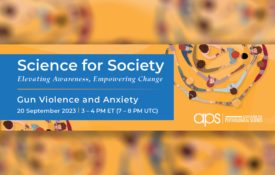
Podcast: Dr. Amanda Nickerson joins Under the Cortex to explore the developmental pathways and risk factors for being exposed to gun-related violence.

A group activity can help students reflect on different kinds of dehumanization and brainstorm a more prosocial path forward.

“The one gene, one disease idea is a thing of the past.” Scientists aren’t simply trying to identify people who are innately predisposed to incivility, immorality, or lawlessness. They’re examining how parenting, education, and other life experiences trigger those biological leanings.

Research on war, conflict, and authoritarianism published in various APS journals between 2008 and 2020.

As of December 2021, a record 82.4 million people have been forced to flee their homes to escape war, violence, or persecution. Here’s a look at some recent research (2017–2021) on refugee integration and well-being.

Addressing a crisis like this means looking directly at the problem-solving needs that arise in times of war, danger, or difficulty and empowering ourselves to meet these needs.

Arielle Baskin-Sommers explores the cognitive-affective processes associated with disinhibition and community violence.

We’ve all been on the receiving end of an angry glare, whether from a teacher, parent, boss, or significant other. These angry expressions seem to boost the effectiveness of threats without actual aggression, according to

Most research on negotiations has shown that showing anger can win you larger concessions, but a psychological study shows it can hurt your cause when used in certain cultural environments.

Research reveals unequivocal evidence that exposure to media violence increases the likelihood of aggressive and violent behavior in both immediate and long-term contexts.

Long thought to result from fragile self-esteem, bullying may instead stem from grandiose, inflated, and narcissistic self-assessment, some psychological scientists argue.

Using eye-tracking technology, researchers have found that women with a history of depression tend to spend more time looking at the angry faces compared to women with no history of depression.

Violent individuals are often assumed to suffer from a long history of mental illness that compels them to act destructively, but the link between psychosis and aggressive acts may be weak.

A large data analysis shows only minimal impact of violent video games on aggressive behavior, but scientists say they need better measures to confirm those findings.

A mix of behavioral research, economic studies, and time-series data portend some unsettling effects of climate change on human social interactions.

Findings from a longitudinal study suggest that childhood bullying may lead to long-lasting health consequences, impacting psychosocial risk factors for cardiovascular health well into adulthood.

The latest issue of Perspectives on Psychological Science is dedicated to the singular topic of microaggressions: statements, policies, and environmental cues that carry racial and prejudicial overtones.

Angry negotiators can make irrational decisions that lead to lower offers, but researchers from Saarland University demonstrate that a simple self-regulation plan can help cooler heads prevail.

If you are worried about violent video games triggering aggressive behavior in children, new research may help to alleviate your concerns.

Hot weather seems to amplify people’s responses to provocation, ultimately increasing rates of aggressive behavior and violence.

A meta-analysis finds no clear link between video game violence and aggression in children.

People tend to view a social media comment that calls out offensive behavior positively, but not when it's echoed by several other commenters.

Instructors should be prepared to listen for —and challenge — belief perseverance, and can use this myth to highlight how automatic and difficult belief perseverance can be to overcome.

A study involving Dutch Police Academy recruits suggests that aggressive individuals may be more sensitive to the effects of testosterone when faced with emotionally charged situations.

Aggression appears to relate to superior anger-identification abilities.

New findings raise the possibility that men with a specific mix of biology and personality traits may be prone to aggressive driving as well as other fiery behavior.
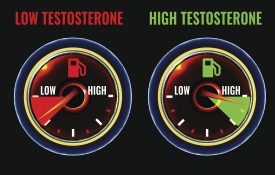
Spanking at age 5 is associated with increased behavior problems 1 and 3 years later -- an increase that cannot be attributed to characteristics of the child or the family environment

Narrative interventions using storytelling may provide impactful solutions for shifting behavioral intentions, beliefs, and attitudes around extremist violence.

Civil unrest and political violence may be related to the psychological burden of the COVID-19 pandemic.

The National Institutes of Health (NIH) has issued an invitation to researchers who currently hold an R01 or R21 grant to expand the focus of their research to include firearms research.

The very same technologies that make social distancing bearable in the age of COVID-19 have also been cited among leading causes of social isolation and mental health issues. Psychological research suggests a more nuanced reality.

Repeated incidences of racial discrimination and violence have far reaching consequences for mental health.
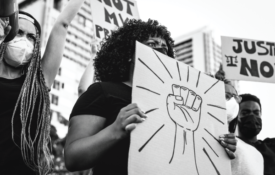
With the passage of the 2020 US funding bill in December, US federal funding dollars will finally be allocated for research on gun violence and ways to prevent it.
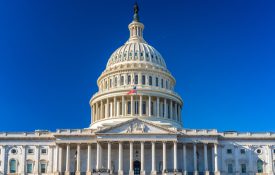
NIH has issued a new funding opportunity to support research on injuries and death resulting from firearms. This cross-NIH opportunity is another in a line of new grants that support research on this topic.

A study shows the role that “plausible deniability" may in discriminatory behavior against marginalized groups.

A longitudinal twin study suggests that victimization makes general and far-reaching contributions to mental disorders.

Learn what researchers have discovered about the factors that lead to bullying and the long-term consequences it can have.

A new study links workplace bullying to negative health outcomes for employees, including increases in long-term sick leave and prescriptions for antidepressants.

Leaders who view themselves as less competent are much more likely to act out aggressively towards their subordinates.

Research exploring factors that contribute to wrongful convictions reveals a path for addressing the serious consequences of wrongful incarceration.

Research in psychological science reveals the causes and consequences of bullying behavior in the office.

New research associates early life adversity with the presentation of social anxiety disorder later in life.

Kitty Genovese's murder caught the attention of the public and psychological scientists alike, but new research indicates we’ve had the story all wrong for the last 50 years.

Psychological science on the effects of prejudice, and how to counter these beliefs.

People who score high on a measure of sadism seem to derive pleasure from behaviors that hurt others, and are even willing to expend extra effort to make someone else suffer, a study shows.
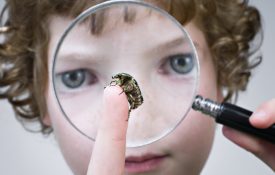
Why are we scared of some things and not others? Psychological scientists are exploring the many facets of fear and the mechanisms that drive it.

Victims of workplace bullying often become stressed and anxious, making them easy targets for additional abuse.

The intense exhaustion of parental burnout can lead parents to feel detached from their children and unsure of their parenting abilities.

Research aimed at understanding men who sexually harass subordinates in the workplace suggest these individuals are able to convince themselves they're not to blame for their behavior.

A look at several researchers who have studied racism in recent years. Collectively, they address the nature of racism and the social processes that maintain it; examine the issues of structural and institutional racism; explore the consequences of various forms of racism; and suggest possible paths of action to combat racism.
